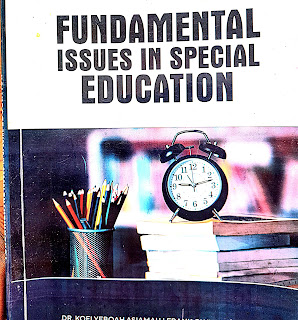Basic Special Education Issues Summary, objective questions, theoretical questions, and others
 |
| Book |
The crucial field of special education in Ghana necessitates a solid comprehension of its underlying ideas. The educational system that supports students with disabilities, including those who have physical, cognitive, and behavioral difficulties, is built on these ideas.
Inclusion is one of the essential tenets of special education in Ghana. This idea promotes including kids with disabilities in conventional classroom settings so that they can study with their peers who are not disabled. This strategy is essential for encouraging all kids to feel a sense of belonging, acceptance, and tolerance.
The idea of individualization is another key idea. To the fullest extent possible, each student with a handicap deserves individualized care. Individualized education plans (IEPs), which describe each student's unique needs and the approach to meeting them, must be created by special education teachers.
Collaboration is a core value in Ghanaian special education as well. Promoting the achievement of kids with disabilities depends on collaboration between special education teachers, regular classroom teachers, parents, and other stakeholders. It makes sure that everyone is collaborating to advance the academic and social development of students with disabilities.
To sum up, the core tenets of special education in Ghana offer a foundation for providing inclusive and effective education to students with disabilities. A strong special education system that meets the individual requirements of each student is built on the tenets of inclusion, individualization, and collaboration.
To Join The Past Questions Platform, Tap On The WhatsApp Button
Sample Theory Questions
1. Describe inclusion as a core principle of special education and discuss its significance. How can diversity be encouraged in a school environment?
2. Describe the special education idea of individualization. What should be in an IEP? How can teachers create individualized education plans (IEPs) for children with disabilities?
3. Special education is based on the idea of collaboration. Describe how cooperation between special education teachers, regular classroom teachers, parents, and other stakeholders helps disabled kids' academic and social development.
4. Talk about the difficulties educators have in applying the basic ideas of special education, such as inclusion, individualization, and collaboration. What methods can be employed to overcome these obstacles?
5. How are the fundamental tenets of special education affected by our awareness of cultural diversity? Give instances of how cultural diversity might be incorporated into the classroom to make learning more inclusive and successful for students with disabilities.
Post a Comment